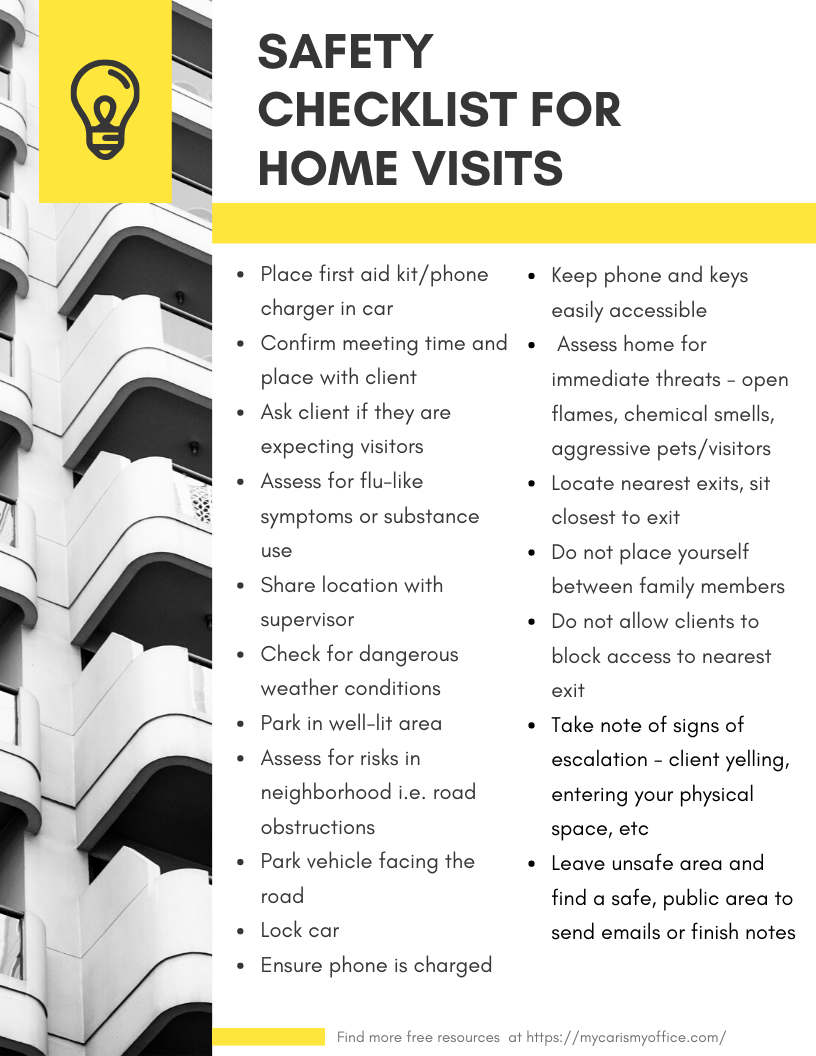Free Safety Checklist for Home Visits
Community mental health professionals and home-based therapists have always been more at risk in the field than other settings. Whether they are challenged by a hostile client experiencing a crisis, a domestic violence event in the home, or they spend hours on the road in areas without cell service or in neighborhoods with higher crime rates, home-based professionals face unique hazards. According to the Center for Disease Control, home-based therapists could also be at a “high” or “very high” risk for coronavirus exposure depending on a variety of service factors.
On top of these existing risks, factors about the therapist as a person can increase the level of risk when visiting clients in their homes. Racial disparities in medical care can place black, indegenous, and people of color (BIPOC) at greater levels of risk for coronavirus exposure and death. There are also many examples of black professionals being harmed by law enforcement while engaging in their job duties (like Charles Kinsey and Jemel Roberson, among others), many of whom worked in mental health or human services fields.
This information is not meant to scare new professionals away from this modality but rather to increase awareness of these risk factors. Professionals can also use this information to advocate for real change such as mandated hazard pay and increasing requirements for quality supervision in community mental health agencies.
In the meantime, mental health professionals who see clients in clients’ homes or in the field need to prioritize their safety in addition to the clients’ safety. The safety checklist below can be used as a free resource to encourage safe practices at every point of the session.
Safety Checklist for Home Visits
Before appointment:
- Keep a first aid kit and a portable phone charger in your car
- Contact your client beforehand
- Confirm meeting time and place
- Ask your client if they have any visitors or are expecting any visitors
- Ensure that animals will be picked up for appointment - can include animals that are aggressive or animals to which you are allergic
- Ensure your client has not been experiencing COVID-19 symptoms or has been in contact with someone who tested positive for COVID-19
- Assess your client on the phone call for any signs of hostility or substance use (verbal abuse, speech differences, etc).
- Share your location with your supervisor or with another team member (not with a friend or family member - sharing client addresses outside of your agency for this purpose is a HIPAA violation)
- Check for potential dangerous weather conditions before traveling
- Ensure your phone is charged
- Assess neighborhood for safety risks - low lit areas, hanging branches, obstruction in roads, etc
- Park your vehicle facing towards the road so that if you had to make a quick getaway you can just pull out instead of backing up first
- Lock your car
During appointment:
- Keep your keys and phone easily accessible during appointment
- Assess the home for immediate safety threats such as an open flame, chemical smells, aggressive pets/visitors
- Locate the nearest exit and sit closest to the exit
- Do not place yourself physically between two family members
- Position yourself so that family members are not blocking your exit
- Keep track of signs that situations are escalating - clients begin yelling, throwing items, engaging in verbal abuse, entering your physical space, etc
- If situation escalates, tell client you've received an emergency text from your supervisor and leave quickly and safely.
After appointment:
- Inform supervisor or team member that you are leaving for next appointment
- If you are in an unsafe area, travel to a safe, public area before stopping to send an email or text or to complete any notes
Reviewing this checklist can not only increase your safety during home visits but can also increase your comfort level in the home which is associated with better therapeutic outcomes. Be sure to share the free graphics below with coworkers, supervisors, educators, students, and agency CEOs so that we can all make this field a little safer.

